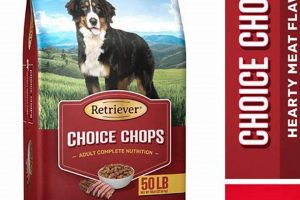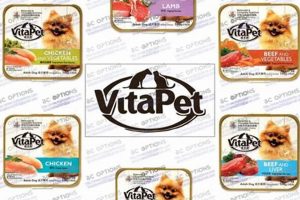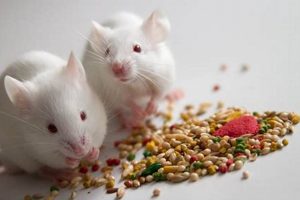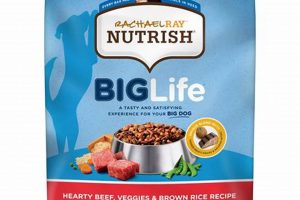Nutritional provisions designed specifically for the dietary needs of growing Doberman Pinscher canines are a crucial element of their development. These formulations are created to support optimal growth, bone strength, and overall health during the crucial puppy stage. For example, these food products often contain higher levels of protein and calcium compared to adult formulations.
Providing these specialized diets has a direct impact on the animal’s wellbeing, assisting in the prevention of developmental orthopedic diseases, supporting healthy muscle development, and contributing to a robust immune system. Historically, less attention was paid to breed-specific nutritional requirements, leading to potential health issues in maturing canines. Current scientific understanding now emphasizes the benefits of tailored dietary approaches.
The subsequent sections will delve into the specific nutritional requirements of Doberman puppies, discussing key ingredients, optimal feeding schedules, and potential health considerations to be aware of during this formative period. Careful attention to these aspects can promote a long and healthy life for this breed.
Nutritional Guidance for Doberman Pinscher Puppies
The following recommendations address key considerations when selecting sustenance for growing Doberman Pinschers. Prioritizing these factors can contribute to optimal development and long-term health.
Tip 1: Select Breed-Specific Formulations: Breed-specific formulas acknowledge the rapid growth rate and unique musculoskeletal structure of Dobermans. These products typically contain balanced calcium and phosphorus levels to support proper bone development, mitigating the risk of orthopedic issues such as hip dysplasia or wobbler syndrome.
Tip 2: Prioritize High-Quality Protein Sources: Protein is essential for muscle development and overall growth. Look for named meat sources (e.g., chicken, lamb, beef) as the primary ingredient. Avoid foods with excessive amounts of plant-based proteins or unnamed meat by-products.
Tip 3: Monitor Calcium and Phosphorus Ratios: Dobermans are particularly susceptible to over-supplementation of calcium. Ensure the food’s calcium to phosphorus ratio is within the acceptable range (approximately 1.2:1 to 1.4:1) to avoid skeletal abnormalities.
Tip 4: Control Caloric Intake: Overfeeding can lead to rapid growth, increasing the risk of skeletal problems. Adhere to the feeding guidelines on the food packaging, adjusting as necessary based on the puppy’s individual needs and activity level. Regular weight checks and veterinary consultation are advised.
Tip 5: Incorporate Omega-3 Fatty Acids: Omega-3 fatty acids, such as DHA and EPA, support brain development and cognitive function. They also contribute to a healthy coat and skin. Consider foods with added fish oil or flaxseed.
Tip 6: Avoid Excessive Supplementation: Unless specifically directed by a veterinarian, avoid adding extra calcium, vitamin D, or other supplements to a balanced puppy food. Over-supplementation can be detrimental, especially in a rapidly growing breed like the Doberman.
Tip 7: Implement a Consistent Feeding Schedule: Establish a regular feeding routine, typically 3-4 times per day for young puppies, gradually decreasing to twice a day as they mature. This helps regulate digestion and prevent overeating.
Adherence to these guidelines, combined with consistent veterinary care, can significantly enhance the health and well-being of Doberman puppies, laying the foundation for a long and active life.
The following section will address potential health concerns and special considerations when selecting sustenance.
1. Breed-specific formulations
Breed-specific formulations represent a tailored approach to canine nutrition, directly impacting the health and well-being of a Doberman Pinscher puppy. The connection between these specialized diets and sustenance designed for Doberman puppies lies in the acknowledgement of the breed’s unique physiological and developmental requirements. For instance, large-breed puppies, including Dobermans, are predisposed to rapid growth, which, if uncontrolled, can lead to skeletal abnormalities such as hip dysplasia or osteochondrosis. Breed-specific formulas address this by carefully regulating calcium and phosphorus levels and maintaining appropriate calorie density, thereby mitigating the risk of these developmental orthopedic diseases. Without such tailored formulations, Doberman puppies are at a higher risk of developing long-term health issues.
These specialized diets also often include ingredients to support joint health, such as glucosamine and chondroitin. These compounds contribute to cartilage development and maintenance, crucial for the active lifestyle of a Doberman. Furthermore, breed-specific options often account for potential sensitivities or predispositions common to the breed. For example, some formulations may be designed to support digestive health, considering potential sensitivities within the Doberman breed. The practical application of this understanding involves careful selection of food labels, prioritizing formulations explicitly designed for large-breed puppies and those specifying suitability for Doberman Pinschers, when available, or through veterinary consultation to select appropriate nutritional profiles.
In summary, breed-specific formulations for Doberman puppies represent a crucial element of preventative healthcare, emphasizing the importance of tailored nutrition in addressing the breed’s unique developmental and physiological needs. The challenge lies in discerning genuinely beneficial formulations from marketing ploys and understanding that veterinary consultation is paramount in ensuring the chosen food optimally supports the puppy’s health. This connection between specialized formulations and optimal Doberman puppy sustenance directly influences the long-term health and vitality of the animal.
2. Protein source quality
Protein source quality is a critical determinant of the nutritional value of sustenance intended for Doberman Pinscher puppies. Its impact extends beyond mere protein quantity, influencing growth, muscle development, immune function, and overall health. The selection of high-quality protein sources directly correlates with the bioavailability and utilization of amino acids essential for optimal puppy development.
- Amino Acid Profile and Completeness
High-quality protein sources provide a complete amino acid profile, containing all essential amino acids in sufficient quantities. Essential amino acids, such as lysine, methionine, and tryptophan, cannot be synthesized by the puppy and must be obtained from the diet. Animal-based protein sources like chicken, beef, and fish generally offer more complete amino acid profiles compared to plant-based sources. Inadequate intake of essential amino acids can lead to impaired growth, muscle wasting, and weakened immune responses.
- Digestibility and Bioavailability
Protein source digestibility refers to the proportion of protein that can be broken down and absorbed by the puppy’s digestive system. Highly digestible protein sources, such as eggs and hydrolyzed protein, are more readily absorbed, maximizing amino acid availability. Conversely, poorly digestible protein sources can lead to digestive upset and reduced nutrient absorption. Factors affecting digestibility include the processing method, ingredient quality, and the puppy’s digestive health.
- Absence of Anti-Nutritional Factors
Certain protein sources, particularly plant-based ones, may contain anti-nutritional factors that interfere with protein digestion and absorption. For example, soy products contain trypsin inhibitors that can reduce protein digestibility. Proper processing and formulation can mitigate the effects of these anti-nutritional factors, but careful consideration of the protein source’s origin and processing is essential.
- Impact on Muscle Development and Growth
Adequate intake of high-quality protein is crucial for supporting rapid muscle development during the puppy stage. Protein provides the building blocks for muscle tissue synthesis and repair. Doberman puppies, known for their athletic build, require sufficient protein to support their muscle mass and activity levels. Insufficient protein intake can result in stunted growth, reduced muscle mass, and decreased overall vitality.
The selection of sustenance for Doberman Pinscher puppies necessitates a thorough evaluation of the protein source quality, considering the amino acid profile, digestibility, presence of anti-nutritional factors, and impact on muscle development. Prioritizing sustenance formulated with high-quality, readily digestible protein sources is paramount for ensuring optimal growth, immune function, and overall health throughout the puppy’s development. Consultation with a veterinarian or canine nutritionist is advisable to determine the most appropriate protein sources and dietary formulations for individual Doberman puppies, considering their specific needs and sensitivities.
3. Calcium
The dietary calcium to phosphorus ratio is a critical factor in the selection of sustenance for Doberman Pinscher puppies. Maintaining a balanced ratio is essential for proper skeletal development and minimizing the risk of developmental orthopedic diseases commonly seen in large-breed canines.
- Ideal Ratio and Skeletal Development
The ideal calcium to phosphorus ratio for growing Doberman puppies is generally considered to be between 1.2:1 and 1.4:1. This range facilitates optimal calcium absorption and utilization for bone mineralization. Imbalances, particularly excessive calcium intake relative to phosphorus, can disrupt normal bone growth and lead to skeletal abnormalities such as hip dysplasia, osteochondrosis dissecans (OCD), and hypertrophic osteodystrophy (HOD).
- Hormonal Regulation and Bone Remodeling
Calcium and phosphorus homeostasis is tightly regulated by hormones, including parathyroid hormone (PTH) and calcitriol. Imbalances in the dietary calcium to phosphorus ratio can disrupt these hormonal control mechanisms, leading to abnormal bone remodeling. For instance, excessive calcium intake can suppress PTH secretion, which in turn can impair bone resorption and mineralization.
- Sources of Calcium and Phosphorus in Sustenance
Calcium and phosphorus are derived from various ingredients in sustenance, including meat, bone meal, and supplemental minerals. Sustenance manufacturers must carefully formulate their products to ensure that the calcium to phosphorus ratio falls within the recommended range. Ingredient quality and processing methods can also affect the bioavailability of these minerals. For example, poorly processed bone meal may have reduced calcium bioavailability.
- Clinical Implications of Imbalances
Clinical signs of calcium to phosphorus imbalance in Doberman puppies can range from subtle lameness and joint pain to severe skeletal deformities and growth disturbances. Radiographic evaluation may reveal abnormal bone density, widening of the growth plates, and joint abnormalities. Correcting the dietary imbalance through appropriate sustenance adjustments and, in some cases, veterinary intervention is crucial for managing these conditions.
Achieving an appropriate calcium to phosphorus ratio in the sustenance is paramount for promoting healthy skeletal development in Doberman puppies. Sustenance selection should prioritize formulations specifically designed for large-breed puppies and those with guaranteed analyses demonstrating a balanced calcium to phosphorus ratio within the recommended range. Veterinary consultation is advisable to address specific concerns and ensure optimal nutritional management.
4. Controlled calorie intake
Controlled calorie intake is a pivotal aspect of sustenance for Doberman Pinscher puppies. The regulation of caloric density in their diets significantly influences growth rate, skeletal development, and the prevention of certain breed-specific health issues. Overfeeding or excessively caloric sustenance can lead to rapid growth, increasing the risk of developmental orthopedic diseases. Careful management is therefore essential.
- Growth Rate and Skeletal Development
Excessive caloric intake accelerates growth rate, placing undue stress on developing bones and joints. Doberman puppies, being a large breed, are particularly susceptible to these effects. Rapid growth can outpace the mineralization process, leading to weakened bones and an increased risk of conditions like hip dysplasia, elbow dysplasia, and osteochondrosis. Controlled calorie intake allows for a more gradual and sustainable growth trajectory, supporting proper skeletal maturation.
- Risk of Obesity
Uncontrolled calorie consumption contributes directly to obesity. Overweight puppies are at a higher risk for a multitude of health problems, including orthopedic issues, cardiovascular disease, and diabetes. Maintaining an appropriate body condition score through calorie management is crucial for long-term health and well-being. Monitoring food intake and adjusting portions based on activity level and individual metabolic needs is essential.
- Metabolic Programming
Early-life nutrition, including calorie intake, can have lasting effects on metabolic programming. Overfeeding during the puppy stage can lead to alterations in fat cell development and metabolism, predisposing the animal to obesity later in life, even if caloric intake is subsequently reduced. Controlled calorie intake helps establish healthy metabolic patterns, promoting better weight management throughout the animal’s lifespan.
- Joint Health and Mobility
Excess weight places increased stress on joints, accelerating cartilage wear and tear. This can lead to the development of osteoarthritis, a degenerative joint disease that causes pain and reduced mobility. Controlled calorie intake helps maintain a healthy body weight, minimizing stress on joints and supporting long-term joint health and mobility. Supplementation with joint-supportive ingredients, such as glucosamine and chondroitin, may also be beneficial, but should not be considered a substitute for appropriate calorie management.
In conclusion, controlled calorie intake is integral to the selection and management of sustenance for Doberman Pinscher puppies. By mitigating rapid growth, preventing obesity, establishing healthy metabolic patterns, and supporting joint health, careful calorie management contributes significantly to the overall health and well-being of this breed. Consideration of these factors, combined with regular veterinary monitoring, is paramount for ensuring optimal growth and development.
5. Omega-3 fatty acids
Omega-3 fatty acids play a critical role in the dietary management of Doberman Pinscher puppies, influencing various aspects of their health and development. Their inclusion in canine sustenance addresses specific needs arising from the breed’s physiology and rapid growth phase.
- Brain and Vision Development
DHA (docosahexaenoic acid), a key omega-3 fatty acid, is vital for optimal brain and retinal development in puppies. Adequate DHA levels support cognitive function, learning ability, and visual acuity. Sustenance formulated with DHA, often derived from fish oil, benefits Doberman puppies during their crucial developmental stages. For example, studies have shown that puppies fed DHA-supplemented diets exhibit improved performance in cognitive tests.
- Skin and Coat Health
EPA (eicosapentaenoic acid), another important omega-3 fatty acid, contributes to healthy skin and coat in Doberman puppies. EPA helps regulate inflammatory responses in the skin, reducing the risk of allergies and dermatological issues. It also promotes a glossy coat by supporting the production of skin oils. Sustenance containing EPA can alleviate dry, itchy skin and improve coat quality, particularly beneficial for Dobermans prone to skin sensitivities.
- Joint Health and Inflammation
Omega-3 fatty acids possess anti-inflammatory properties, which can help mitigate joint inflammation and support joint health in Doberman puppies. Given the breed’s predisposition to musculoskeletal issues like hip dysplasia, incorporating omega-3s into their sustenance may provide preventative benefits. By reducing inflammation in the joints, omega-3s can help alleviate pain and improve mobility. Studies suggest that omega-3 supplementation can slow the progression of osteoarthritis in canines.
- Cardiovascular Support
Omega-3 fatty acids have been shown to promote cardiovascular health in canines. They can help reduce triglyceride levels, lower blood pressure, and improve overall heart function. Dobermans are known to be susceptible to certain cardiac conditions, such as dilated cardiomyopathy (DCM). While not a cure, omega-3 supplementation may provide supportive benefits for cardiovascular health in this breed. Consultation with a veterinarian is essential to determine appropriate dosages and potential interactions with other medications.
The inclusion of omega-3 fatty acids in sustenance for Doberman Pinscher puppies offers a multifaceted approach to supporting their health and well-being. Addressing developmental needs, dermatological concerns, joint health, and cardiovascular function, omega-3s represent a valuable component of a comprehensive nutritional strategy for this breed. Careful consideration of omega-3 sources, levels, and potential interactions with other dietary factors is necessary to maximize their benefits.
6. Minimizing supplements
The principle of minimizing supplemental additions to commercial sustenance for Doberman puppies is fundamentally linked to the formulation philosophy of reputable canine food manufacturers. These manufacturers design sustenance to provide a complete and balanced nutritional profile, accounting for the specific requirements of growing, large-breed canines. The Doberman, with its rapid growth rate and predisposition to skeletal issues, demands a meticulously balanced intake of nutrients, particularly calcium and phosphorus. Indiscriminate supplementation can disrupt these carefully calibrated ratios, leading to adverse health outcomes. For example, over-supplementation of calcium, a common error, can suppress parathyroid hormone, impairing bone remodeling and increasing the risk of developmental orthopedic diseases like hip dysplasia and osteochondrosis.
Practical application of this principle involves careful selection of sustenance based on label analysis and adherence to feeding guidelines. Veterinarians often advise owners to resist the urge to add vitamins, minerals, or other supplements unless a specific deficiency has been diagnosed through bloodwork and clinical examination. Furthermore, scrutinizing ingredient lists to avoid foods with excessive levels of certain nutrients (e.g., calcium) is crucial. For instance, sustenance containing high levels of bone meal as a primary ingredient may inadvertently contribute to calcium over-supplementation, even without the addition of separate calcium supplements. Real-life examples reveal instances where well-intentioned owners, believing they were promoting their puppys health, caused significant harm through unsupervised supplementation practices.
In summary, minimizing supplements in the dietary regimen of Doberman puppies is an essential practice, contingent upon the selection of high-quality, breed-appropriate sustenance and adherence to veterinary recommendations. Challenges arise from misinformation, marketing claims, and the inherent desire to optimize the animal’s health. However, understanding the potential for harm from nutritional imbalances and prioritizing a balanced approach, rather than indiscriminate supplementation, is vital for ensuring optimal growth and development. The broader theme underscores the importance of informed decision-making and veterinary guidance in canine nutrition, emphasizing that more is not always better.
Frequently Asked Questions Regarding Doberman Puppy Sustenance
The following frequently asked questions (FAQs) address common concerns and misconceptions pertaining to the selection and management of sustenance for developing Doberman Pinscher canines. This information is intended to provide clarity and evidence-based guidance on optimal nutritional practices.
Question 1: Is breed-specific sustenance truly necessary for Doberman puppies?
Breed-specific sustenance, particularly formulations designed for large-breed puppies, is generally recommended. These formulations account for the unique growth rates and physiological demands of Dobermans, particularly concerning skeletal development and the prevention of orthopedic diseases.
Question 2: What constitutes a high-quality protein source in sustenance for a Doberman puppy?
A high-quality protein source is characterized by its amino acid profile and digestibility. Named meat sources (e.g., chicken, beef, lamb) are preferable. Avoid sustenance containing excessive amounts of plant-based proteins or unnamed meat by-products.
Question 3: How critical is the calcium to phosphorus ratio in Doberman puppy sustenance?
The calcium to phosphorus ratio is of paramount importance. An imbalance, particularly excessive calcium, can lead to skeletal abnormalities. Aim for a ratio between 1.2:1 and 1.4:1, and avoid over-supplementation unless specifically directed by a veterinarian.
Question 4: Can overfeeding Doberman puppies lead to long-term health problems?
Overfeeding contributes to rapid growth, increasing the risk of developmental orthopedic diseases. Controlled calorie intake is essential for maintaining a healthy growth trajectory and preventing obesity-related health issues.
Question 5: What role do omega-3 fatty acids play in the sustenance of a Doberman puppy?
Omega-3 fatty acids support brain and vision development, promote skin and coat health, and possess anti-inflammatory properties that may benefit joint health. Sustenance containing DHA and EPA from sources like fish oil can be advantageous.
Question 6: Are vitamin and mineral supplements generally necessary for Doberman puppies consuming a balanced sustenance?
Unless specifically indicated by a veterinarian, vitamin and mineral supplements are typically not necessary. High-quality, breed-appropriate sustenance is formulated to provide a complete and balanced nutritional profile, and over-supplementation can disrupt these carefully calibrated ratios.
The key takeaway from these FAQs is the critical importance of selecting sustenance that is specifically formulated for large-breed puppies, paying close attention to protein sources, mineral ratios, and caloric content. Consulting with a veterinarian or canine nutritionist is strongly recommended.
The following section will provide specific recommendations for sustenance brands and formulations that align with the principles outlined above.
Dog Food for Doberman Puppy
The selection of dog food for Doberman puppy demands meticulous attention to detail. As explored within this article, optimizing a Doberman puppy’s dietary intake requires careful consideration of breed-specific formulations, high-quality protein sources, appropriate calcium to phosphorus ratios, controlled caloric intake, and strategic use of omega-3 fatty acids. Minimizing unnecessary supplementation is equally crucial for preventing imbalances and promoting optimal development.
Given the potential for long-term health implications stemming from nutritional choices made during the puppy stage, consulting with a veterinarian or a qualified canine nutritionist is strongly encouraged. Adhering to evidence-based guidelines and prioritizing the unique nutritional needs of this breed represents a significant investment in the long-term health and well-being of the Doberman Pinscher.







